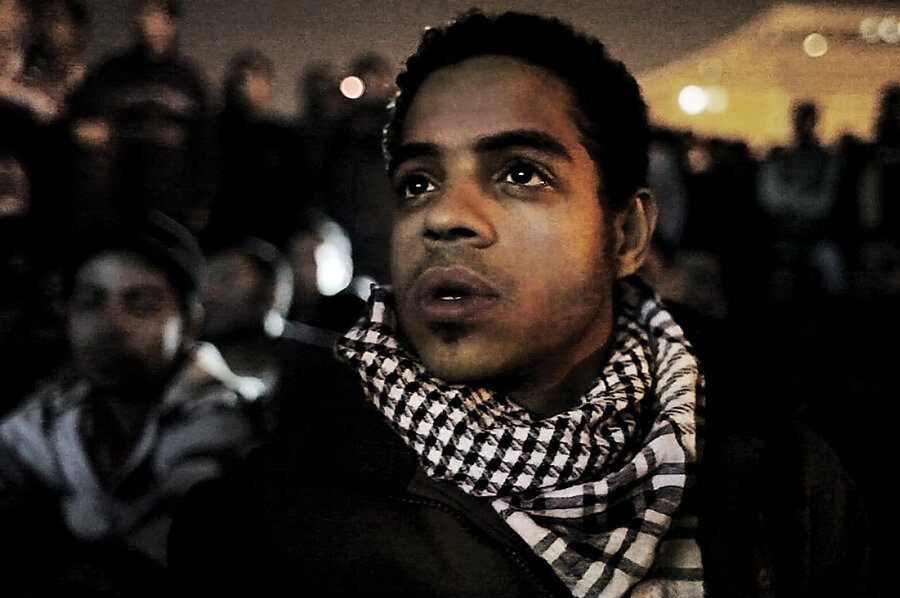'The Square' unveils some of the faces behind Cairo's Tahrir uprising
Loading...
“The Square,” about the popular uprisings in Egypt that began with the 2011 overthrow of President Hosni Mubarak, is a powerhouse documentary that takes us into the eyes of several storms. The film was originally released in January 2013 at the Sundance Film Festival, where it won a major audience award, but director Jehane Noujaim and her cinematographers subsequently returned to the streets of Cairo to extend the movie’s timeline as the democratically elected but autocratic President Mohamed Morsi proved himself no less harsh than Mubarak.
This “final” version of “The Square” – if nothing else, the film points up the unceasing nature of the conflict – covers a period of roughly two years, from the initial popular uprising in Cairo’s Tahrir Square, which forced the overthrow of Mubarak after 30 years of brutal dictatorship, to the summer of 2013 and the removal of Muslim Brotherhood candidate Morsi by the Egyptian Army.
Given the free-form nature of the uprisings and the many political factions involved, Noujaim, an Egyptian-American whose previous films include “Startup.com” and “Control Room,” was wise to build the footage around several individuals who, in their very different ways, also represent large factions.
Among these are Ahmed Hassan, a working-class protester in his mid-20s who, in the 18 days leading up to Mubarak’s resignation, acts as a kind of cheerleader for the “revolution.” But his irrepressible energy is not unthinking: He is continually wary about the possibility that the ideals he is fighting for will be co-opted by equally corrupt forces. When events prove him right, he is both aghast and unsurprised. He is also, against all odds, surpassingly hopeful.
Khalid Abdalla, in his mid-30s, is a British-Egyptian actor who starred in “The Kite Runner.” Inspired by his activist father, who was jailed in Egypt and exiled to London, Abdalla has returned to Cairo to join forces with the uprising and become one of its spokesmen in the international media. (We see a clip of him being interviewed by CNN.)
He’s savvy about how to shape the opinion of Western journalists, but his fervor, which places him at great risk, is genuine.
In some ways the most interesting person, and the most conflicted, is Magdy Ashour, a 40-something protester and member of the Muslim Brotherhood who was tortured by the Mubarak regime. The Brotherhood, banned by Mubarak, becomes a key player in his overthrow.
The Brotherhood’s alliance with Morsi creates a problem for Ashour, who, despite their real differences, has become a friend and ally of Abdalla and Hassan. (Hassan, in particular, despises the Brotherhood for selling out the ideals of the revolution.) Ashour’s crisis of faith is experienced by us in what feels like real time, and his contortions humanize his plight. He’s the man in the middle. Whatever side he chooses has indelible consequences for both him and his family.
One of the incidental, or maybe not so incidental, revelations of “The Square” is how it demonstrates the force of social media in popular uprisings. Atrocities are regularly posted on YouTube; organizational messages and calls for solidarity are tweeted. The usual practices of totalitarian repression are continually counteracted. The preponderance of social media in the Cairo uprisings helps define its youthful core constituency and may explain why the older resisters are more disillusioned than their younger counterparts. When Hassan says that “people are the true power,” he is really referring to the young people who are plugged into the power circuits.
By the film’s end, the main protagonists have become more philosophical, if no less ardent, about the future of Egypt. “We are not looking for a leader,” Hassan declares. “We are looking for a conscience.”
He has only to look in the mirror. Grade: A- (This documentary is not rated.)







